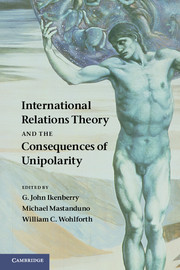Book contents
- Frontmatter
- Contents
- Figures
- Tables
- Notes on the contributors
- Notes on the editors
- 1 Introduction: unipolarity, state behavior, and systemic consequences
- 2 Unipolarity, status competition, and great power war
- 3 Legitimacy, hypocrisy, and the social structure of unipolarity: why being a unipole isn't all it's cracked up to be
- 4 Alliances in a unipolar world
- 5 System maker and privilege taker: US power and the international political economy
- 6 Free hand abroad, divide and rule at home
- 7 The liberal sources of American unipolarity
- 8 Unipolarity: a structural perspective
- 9 Unipolarity and nuclear weapons
- 10 From unipolarity to multipolarity: transition in sight?
- 11 Sell unipolarity? The future of an overvalued concept
- Index
- References
5 - System maker and privilege taker: US power and the international political economy
Published online by Cambridge University Press: 05 June 2012
- Frontmatter
- Contents
- Figures
- Tables
- Notes on the contributors
- Notes on the editors
- 1 Introduction: unipolarity, state behavior, and systemic consequences
- 2 Unipolarity, status competition, and great power war
- 3 Legitimacy, hypocrisy, and the social structure of unipolarity: why being a unipole isn't all it's cracked up to be
- 4 Alliances in a unipolar world
- 5 System maker and privilege taker: US power and the international political economy
- 6 Free hand abroad, divide and rule at home
- 7 The liberal sources of American unipolarity
- 8 Unipolarity: a structural perspective
- 9 Unipolarity and nuclear weapons
- 10 From unipolarity to multipolarity: transition in sight?
- 11 Sell unipolarity? The future of an overvalued concept
- Index
- References
Summary
International relations theorists were slow to recognize that America's unipolar moment had the potential to become an enduring feature of global politics. As that realization has set in, scholars have begun to examine the nature and implications of a one-superpower world. Most of the emphasis has been on the international political and security implications of a distribution of capabilities dominated by the United States. This chapter shifts the focus to an examination of the consequences of unipolarity for the global political economy and for the behavior and influence of the United States within it.
To what extent has the shift in international structure altered the behavior of the United States in the world economy? The evidence offered below suggests that the answer is not very much – there is striking consistency in the international economic behavior of the United States across the bipolar and unipolar eras. The role of the United States in the world economy and the nature and pattern of US economic interactions with other major powers are remarkably similar whether we are examining the 1960s, the 1980s, or the 2000s. US influence, however, has changed in important ways. During the Cold War the United States dominated international economic adjustment struggles. By contrast, its ability to prevail in those struggles after the Cold War has been significantly compromised.
- Type
- Chapter
- Information
- Publisher: Cambridge University PressPrint publication year: 2011
References
- 3
- Cited by



